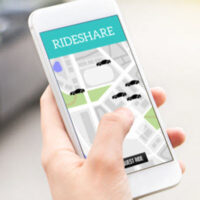If I’m Hurt in an Uber, Can I Sue the Company?

Almost overnight, the ridesharing industry grew from almost nothing to a multi-billion dollar business. In 2015, a third of Americans had never heard of Uber, Lyft, or any other ridesharing company. Three years later, the same percentage of Americans regularly used such services.
Because of this uptick, many ridesharing drivers are naive to their new role. They are unfamiliar with rideshare procedures and also unfamiliar with the routes they travel. So, they often have issues dealing in a reasonable manner with customers on a wide variety of issues. These encounters can often end badly. Additionally, the drivers are frequently over-reliant on GPS navigation aids. They have one eye on the screen and one eye on the road.
If either situation sounds familiar to you, a Tampa personal injury attorney should evaluate your claim. Car crash and assault injuries are difficult to diagnose. As a result, many of these victims do not realize the extent of their own injuries.
Rideshare Operator Duty
Lyft drivers, Uber drivers, and other ridesharing operators are common carriers in Florida. They have a duty of utmost care to deliver passengers and cargo safely from Point A to Point B. This responsibility level is much higher than the duty of reasonable care that usually applies to noncommercial drivers.
In the Sunshine State, the common carrier duty also applies to other commercial operators, such as tour bus drivers.
For example, when it rains, noncommercial drivers have a duty to slow down and be more careful. Arguably, ridesharing operators have a duty to not drive in the rain or at least wait until it slacks off. Ridesharing drivers also have a duty to break up disagreements between passengers and ensure they do not hurt themselves getting in and out of the vehicle.
Negligent Injuries
As mentioned, many ridesharing operators rely almost exclusively on hand-held GPS navigation devices to get passengers to their destinations. These gadgets are technically legal in Florida. However, they involve all three forms of distracted driving, which are:
- Visual (taking one’s eyes off the road),
- Manual (taking one’s hand off the wheel), and
- Cognitive (taking one’s mind off driving).
Hands-free devices are not any safer. They are visually and cognitively distracting. Additionally, they give many drivers a false sense of security.
If a ridesharing operator driver crashes while using a GPS navigation device, the ordinary negligence doctrine typically applies. The aforementioned higher duty of care makes it easier to prove negligence. The ridesharing company is financially responsible for damages in these situations, because of the respondeat superior rule.
Intentional Torts
Assault is an intentional tort which clearly does not fall within the scope of employment. Nevertheless, the ridesharing company might still be legally responsible for damages.
Negligent hiring is hiring unqualified individuals. People with violent criminal records should arguably not deal with customers on a regular basis, especially in close quarters. Negligent supervision is failing to watch employees closely enough, or failing to discipline them when necessary. Frequently, drivers who assault passengers have done so before.
Damages in a personal injury claim usually include compensation for economic losses, such as medical bills, and noneconomic losses, such as pain and suffering.
Count on Dedicated Lawyers
Ridesharing companies are generally responsible for ridesharing injuries. For a free consultation with an experienced Tampa car accident lawyer, contact The Matassini Law Firm. We do not charge upfront legal fees in car accident cases.
Resource:
pewresearch.org/fact-tank/2019/01/04/more-americans-are-using-ride-hailing-apps/
https://www.matassinilaw.com/legal-problems-mount-for-uber-and-lyft/
